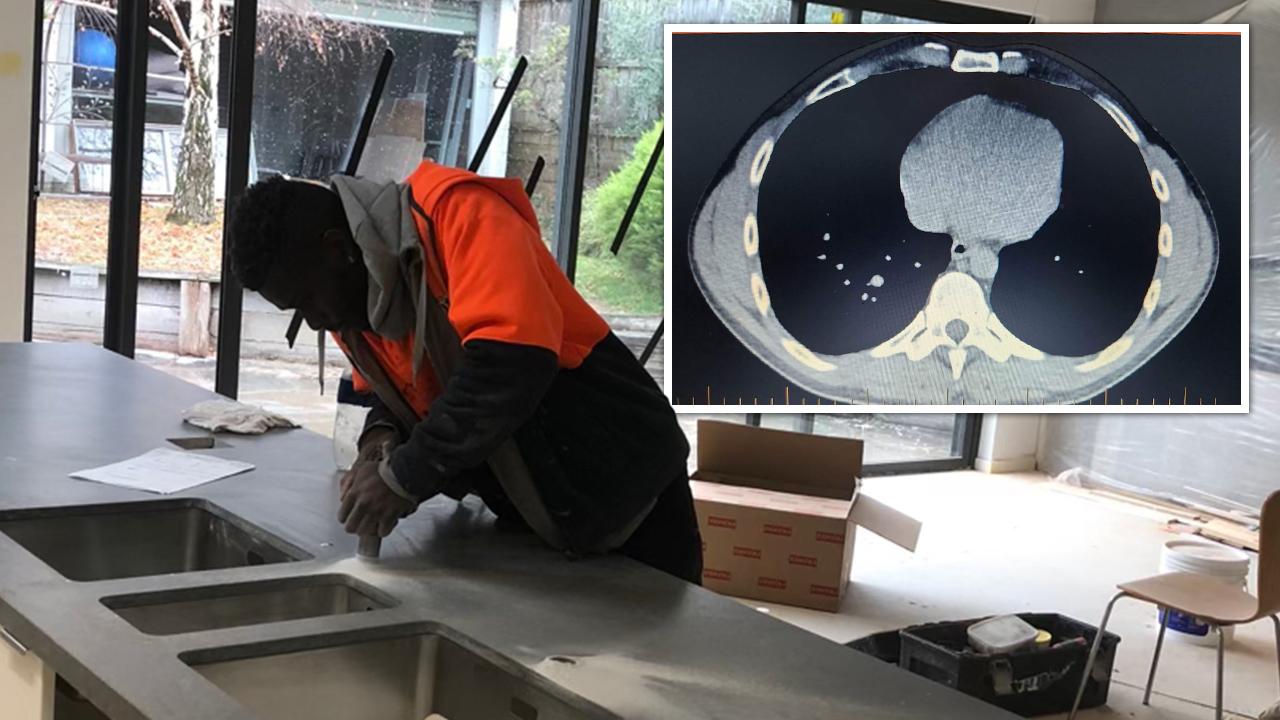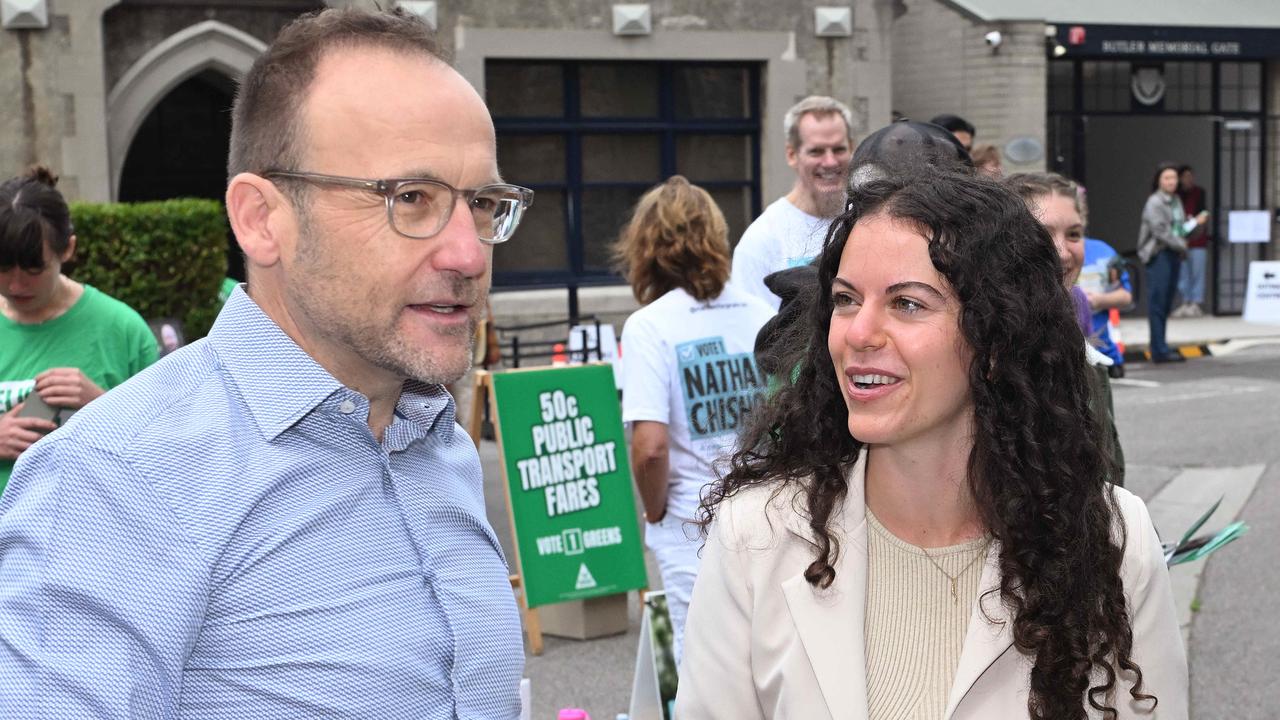Big V Interview: Behind VRC chairman Neil Wilson’s wild ride to the top
He began his working life as a Coles mailroom boy but Neil Wilson has risen to become one of horse racing’s most powerful figures.
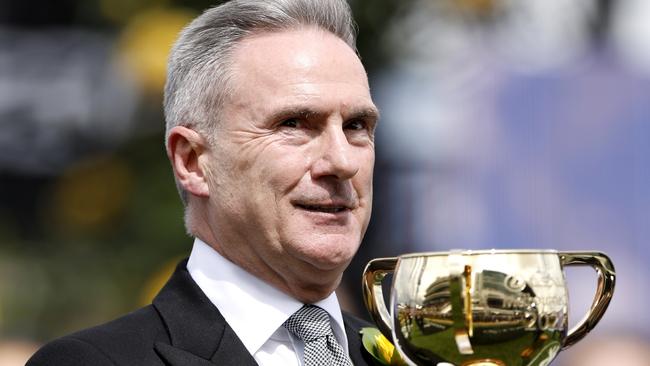
Victoria
Don't miss out on the headlines from Victoria. Followed categories will be added to My News.
A painting of 1979 Melbourne Cup winner Hyperno hangs in Victoria Racing Club chairman Neil Wilson’s office.
The gilt-edged portrait is a poignant reminder of the businessman’s humble entrance to the working world – as a teenager in the GJ Coles mailroom.
Then-managing director of the retail giant, Sir Thomas North, was a co-owner of Hyperno and had been flooded with congratulatory telexes.
“I was delivering mail on the day to the executive area,” Wilson said. “You weren’t allowed to read the mail but one of the telexes might have dropped, and I saw it, which was from Malcolm Fraser, congratulating him on winning the Melbourne Cup.”
Wilson laughed that as a teenager he wasn’t so interested in the message from the then-prime minister but the fact “I’ve actually got something I’m delivering to someone that won the Melbourne Cup”.
The mix of business and horse racing has been a trademark of Wilson’s life ever since. In 2012, the two interests officially cross-pollinated when he joined the VRC board and went on to become honorary treasurer, chief executive and now chairman.
The journey began in regional Victoria in the 1960s, when his father, John, also known as Jack, was dispatched to transform small-town supermarkets.
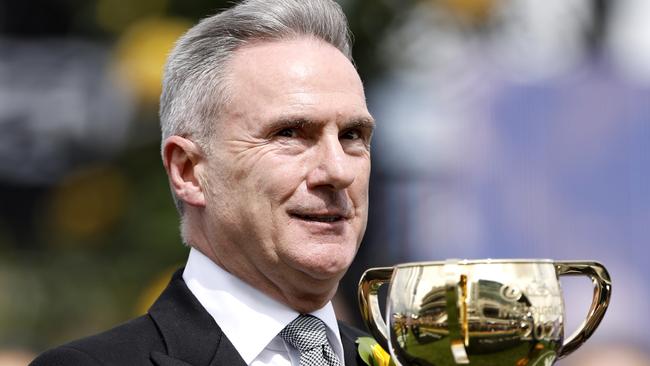
Starting out
It’s not surprising that Wilson knows how to work a room.
As a child of a supermarket manager shifted to a different part of Victoria every few years, it was a skill born out of necessity.
“Walking into a classroom, I learnt some pretty good lessons the hard way, as well as, over time, developing a good sense of assessing a room,” he said.
“I became more confident talking to people. Normally, the bad influences would come to you first.”
Born in Benalla in 1961 and with extended family in Ballarat, Wilson spent the majority of his school life in Sale, Moe and Morwell.
At that time, the Latrobe Valley was dominated by the Hazelwood Power Station and the open-cut mine, with most primary school students from electricity company families or connected to the local doctor or banker.
“Everyone was fairly normalised, so you come in, you go home, you knew your dad was coming home at five o’clock,” he said.
“You lived in similar houses and everything was pretty similar, but the thing that was different was sport.
“The weekend rolled around and football and cricket, predominantly, took over, and that became the differentiator for people.”
While many local kids in the region hung out at footy and cricket clubs, Wilson was a “poor player of both”.
Instead, the gentle whinny of horses reached his ears, thanks to friends.
“I’d go to their farms on the weekends and didn’t do a lot of riding, but I did a lot of engagement with the horses, and would help out, settling them in.”
Quick to point out he was not “an expert in any way”, Wilson said there was an immediate appreciation of the powerful animals.
“I really had an affinity with horses,” he said. “I sort of felt that was very relaxing.”
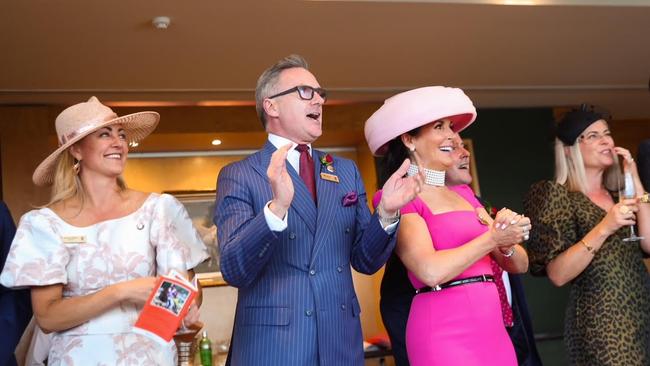
Enter a new world
Shifting homes between Coles centres in regional Victoria continued during Wilson’s primary and early secondary school years.
His first experience of Melbourne was Pascoe Vale, while as a teenager he made a permanent move to Melbourne to do what is now the VCE, at Burwood Heights High School.
But during his final year of school, the family was rocked by Wilson’s father dying of a heart attack at the age of 53.
“Mum (Betty) just wasn’t coping and there was no money left,” he said.
“So, I left school at 18. I was working as a casual in the Vermont South (Coles) supermarket, but a few of Dad’s friends rallied and got me a job to work in the head office on Bourke St.”
Wilson was determined to finish his final year of school and go to university, and for the next 13 years studied part-time, completing his VCE and a degree in accounting and technology, while moving up the ranks at Coles.
He bought a small one-bedroom flat in St Kilda “with no money because I saw a sign that said that the ANZ would lend 95 per cent of the price”.
A meeting with a bank manager threw up a momentary roadblock – Wilson wasn’t an ANZ customer.
Determined to nail the sale, Wilson stood his ground, insisting “it doesn’t say that on the sign”.
At Coles, he became involved in the computerisation of the accounting system and later was the company’s youngest general manager, with about 200 people reporting to him.
In 1996, Wilson took the plunge and left Coles to establish an IT consultancy firm, Charter Wilson.
His wife Stephanie, who he married the previous year, had her own business that the couple decided they could fall back on if necessary, but Charter Wilson grew strongly and was acquired by ASX-listed tech services company Oakton, where Wilson stayed until 2016 – including as chief executive for nine years.
As businesses developed, the couple’s family was also growing, with the arrival of Max in 2001 and sister Sophia in 2006.
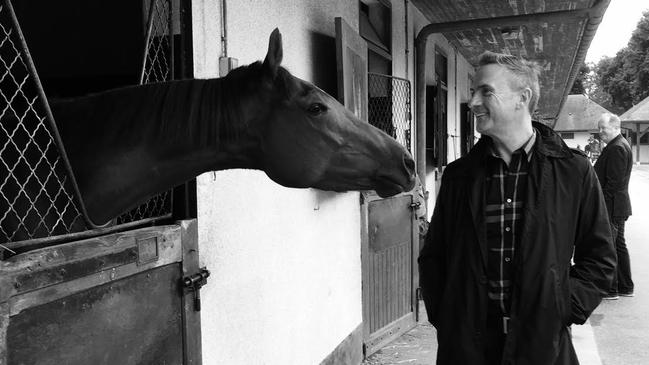
Still horsing around
Wilson then began investing in horses — as an owner and breeder. He currently owns shares in about a dozen thoroughbreds including Zaaki and My Oberon.
Wilson’s most cherished memories as an owner were with the gelding Chasm.
A win on Anzac Day at Flemington was particularly special, given his father was a World War II veteran involved in the decommissioning of the Changi prison in Singapore.
While Jack was tight-lipped on most wartime experiences, the family learnt he enlisted late in the war despite poor eyesight.
“I asked him, ‘How did you get in? And he said ‘Well, I’m in the queue and they use the same eye chart, and I could hear them say ‘Row one, row two, row three’ and I just memorised each row.
“He said ‘I was asked to do row four and I couldn’t even see the sign but I remembered the letters on the row and they let me in’.
“He wore his glasses the whole time he was in the army.”
This year, Anzac Day racing at Flemington was cancelled due to the death of jockey Dean Holland while riding at Donald racetrack.
Wilson said the incident had rocked the racing community and that “our thoughts remain with his family and friends”.
“As big as the racing industry is globally, it is a very tight community and it has wrapped its arms around Dean’s family at this time,” he said.
The VRC will host National Jockeys Trust Race Day at Flemington on Saturday, featuring a race named in his honour, the In Memory of Dean Holland.
The VRC has also announced a permanent tribute, with the Dean Holland Trophy to be awarded to the winning jockey of the Newmarket Handicap in March each year.
In 2012, the tendency for Wilson to be trackside watching his horses, and mingling with trainers, was noticed by then-VRC chairman Michael Burn, who was also familiar with his business successes and asked him to join the board.
“That was a fantastic release from, you know, the toils and the demands of running a public company, and everything that goes with that,” Wilson said.
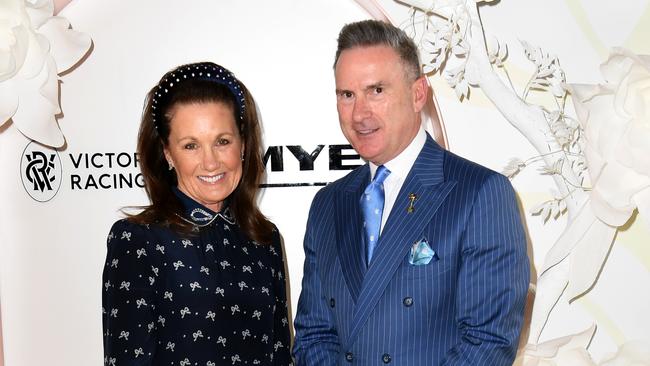
From the outside
It may not be his claim to fame but Wilson is partially responsible for making ATM transactions more personal.
Long before he took the chairman’s reins at the VRC, he was advising banks on IT solutions.
They had spent a fortune assessing customer details in what Wilson described as an “inside-out” mentality, and he encouraged them to shift to an “outside-in” approach where customer views mattered.
“I believe I was part of the change to having your ‘favourite’ transaction stored on an ATM,” he said.
“I said ‘When I go into my online banking, it’s highly configurable, but if I go to an ATM, it doesn’t know me. I have to select six 50s from a cheque account and no receipt’. Now I can store what I want as a favourite transaction.
“I’m sure there are about 100 people claiming the favourite transaction button, but I’m sure it came out of conversations about ‘outside-in’ versus ‘inside-out’.”
As VRC chief executive and then chairman, the outside-in mantra has helped the club stay connected to members.
During Covid-19, electronic race books and tipping competitions were created and special hampers sent to those watching the action from lockdown.
The VRC team is determined to keep on the same track and is investigating whether new formats – such as twilight or rapid-racing events – could become a mainstay at Flemington.
“We’re still thinking about it, along with many other initiatives,” Wilson said. “It’s an expensive exercise. There is a lot to consider with various stakeholders and we have to be mindful not to saturate the market with night racing”.
Meanwhile, the focus remains on premier race days, including the famous Melbourne Cup Carnival.
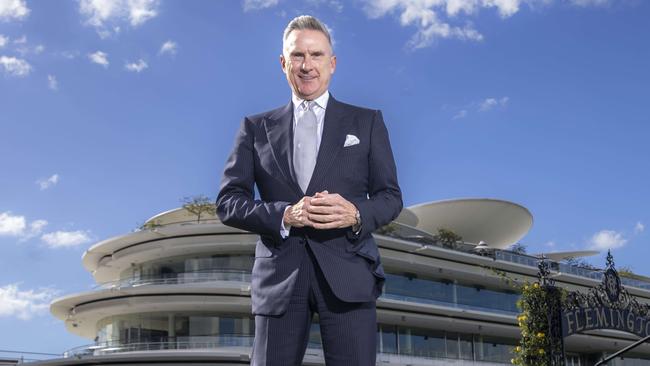
Power of the Cup
Several years ago, the carnival smashed attendance records across its four race days, surpassing 400,000 people. That’s not likely to be repeated, with the VRC now wanting to focus on “experience versus numbers of people”.
“We’re not designing to have that many people, going forward. We think that’s too many,” Wilson said.
“We still have to make money to put back into the event as a not-for-profit but we think there’s a sweet spot to get a better yield at a lower attendance, with a better, value-for-money experience.
“Going forward, we’d expect to have more of an average of 80,000 people, sitting around that 320,000 mark as a total week.”
Last year, the first carnival since Covid-19 attendance caps draw just 250,000 racegoers – partly due to atrocious weather. Even so, it was still worth $422.1m in gross economic benefit to Victoria, with just 10 per cent of that related to wagering – making it the main economic contributor of any annual sporting event in Australia.
Wilson said sales for this year’s carnival were already happening.
“We’ve got an early-bird model – we brought ticket sales forward on last year and it’s going really well,” he said.
Two golden tickets – meaning automatic entry – for the event have also been claimed by Lunar Flare and Goldman, the latter being the current race favourite.
Grandstanding by Racing NSW doesn’t trouble the VRC, despite the challenges of running big races on the same day and the battle for ensuring the stars of the turf come to Melbourne.
“Our approach is not to spend a lot of time trying to anticipate or worry, but to focus on our core strategy, which is to evolve and promote our traditional racing across the year,” Wilson said.
Q&A WITH NEIL WILSON
First job and pay
Working in the delicatessen at Coles supermarket in Vermont South on Friday nights and Saturday mornings for a total of around $24.
If you weren’t doing this job, what would you be doing?
I love being involved in racing and technology industries. If it was something else, maybe an architect.
Five people you’d invite to a dinner party (dead or alive)
Stephanie, my wife: She would love it, and it would be an extensive debrief after dinner; My Dad: I didn’t spend enough time with him, and Stephanie never met him;
Tom Ford: Hearing his story about how his innate talent has taken him to the top in his field; Tom Peters: He has continued to provide inspiration and different thinking for many, many years; the Queen: What a person, what a life – so much to talk about, including her love of thoroughbred race horses.
Book everyone should read
In Search of Excellence – Tom Peters
If you could live anywhere else in the world, where would it be and why?
London – a vibrant global city so close to so much history and current trends.
What advice would you give your 18-year-old self?
Never over or underestimate anyone.
First car, current car, dream car
Light blue Datsun 180B (first); Lexus LC500 (current) and 1000km-capacity fully electric (dream car).
One thing we don’t know about you
I was a roadie for a rock band. I lifted a lot of amplifiers and set up a lot of microphone stands. I also ran a marathon at the age of 55.
Best and worst birthday present you’ve ever received
A special watch (best) that gives me pleasure every day,
and bad clothes (worst).
Rainy day TV binge
Rick Stein’s Long Weekends.
Song that gets you pumped
April Sun in Cuba – Dragon.
Death row last meal
Seafood pasta with chilli accompanied by a good bottle of chablis.
Best piece of advice
Learning the Third Space approach, which is the space between the last conversation you had to get ready for the next conversation – thank you, Dr Adam Fraser.
I’m looking forward to …
The 2023 Melbourne Cup Carnival is shaping as one of the best. I can’t wait for November and to share some of the exciting new initiatives the Victoria Racing Club are working on.
The one thing I’d love to change about Victoria
I would love Melburnians to know more about, and appreciate, country Victoria, and Victorians to know more about, and appreciate, the whole of Australia.
First concert, dream concert
John Farnham (first) and Keith Urban (dream) supporting a duo of Elvis Presley and Harry Styles singing their hits.
The one thing I love the most about Victorians
Our passion for sport, cultural and agricultural major events – they just love to be involved.


